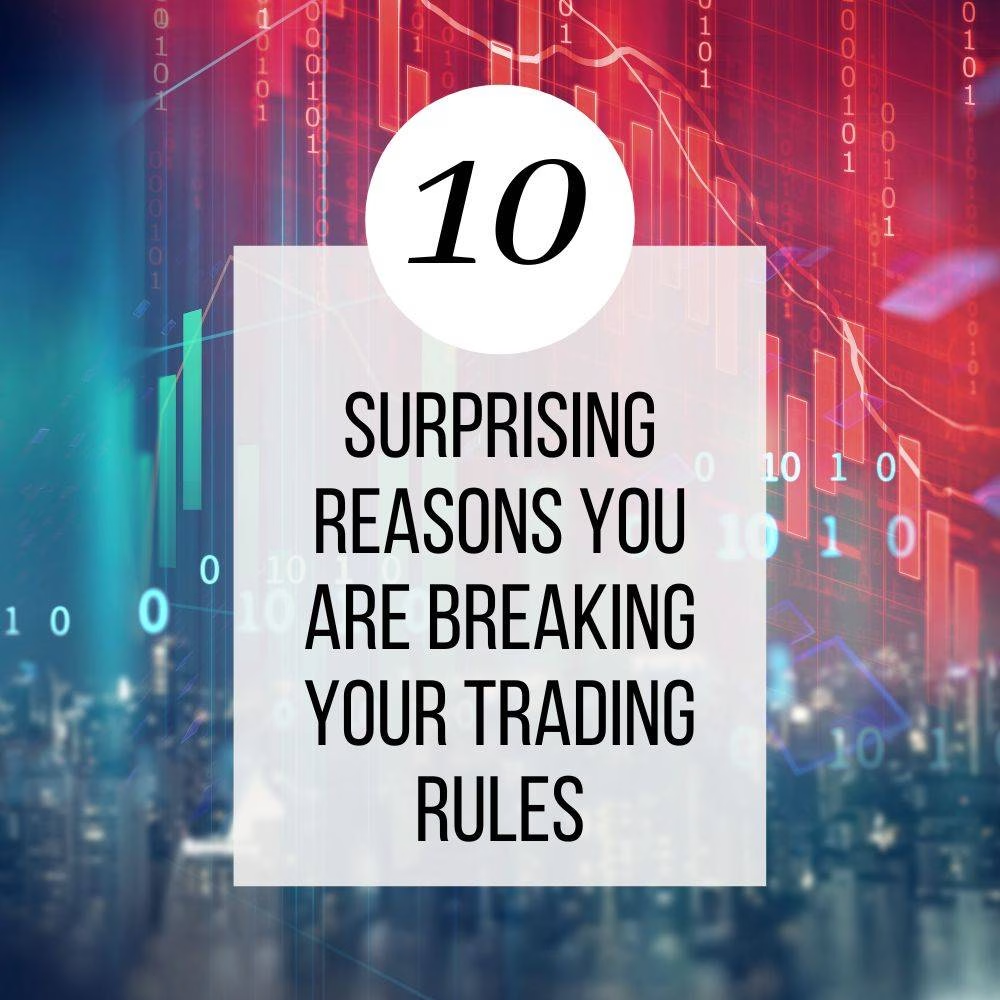You know what you should be doing in your trading – but you just don’t do it. If this statement resonates with you, then you may be one of the many Traders who has a profitable trading strategy and a well-thought-out plan, but who consistently finds themselves at the mercy of their mindset and emotions when it comes to actually executing the plan.
Some examples of this frustrating phenomenon include; breaking your rules by taking trades that don’t fit your set-up, jumping out of trades too soon because the fear of losing money is so intense, or revenge trading as you get angry and try to get back at the market after a loss.
The problem is not down to a lack of willpower or discipline. And it’s definitely not as simple as just needing to reduce your size or manage your risk better.
Check out these 10 Surprising Reasons Why You Are Breaking Your Trading Rules and see how many resonate with you:
#1. You Don’t Use A Mental Preparation Routine Before You Trade
Imagine an NBA Basketball Player heading straight out onto the court for a competitive game without doing a warm up. Unthinkable right? Well – it’s the same in terms of trading. If you want to get in the right mental and emotional zone for trading each day, it’s not something that you can leave up to chance.
Without a trading mental preparation routine, you are missing an opportunity to control how you show up to the market each day. This significantly increases the possibility of you taking emotion-based trades and breaking your trading rules.
#2. Your Money Mindset Is Not Aligned With Generating Wealth
Your conscious mind may be fully on board with your goal of making serious profits from your trading, but what if your subconscious mind is vetoing those plans? A “scarcity” mindset around money could be making you hesitant to pull the trigger when your setup appears. Your hidden belief that “all rich people are greedy and rude” could be stopping you from profiting in the market as your subconscious desperately tries to protect you from becoming wealthy (and therefore one of those rude and greedy people you detest).
#3. You Are Not Setting Effective Goals (Or Any Goals!)
Sure, most Traders have defined an amount of money that they would like to make from trading, maybe even on a daily, weekly and annual basis. But setting goals that only relate to the outcome (i.e., your P&L) can actually increase pressure and exacerbate your tendency to break your trading rules.
And if you don’t set any goals at all – this leaves a huge amount of scope for you to convince yourself that deviating from your trading plan is the best course of action in any given moment in the market.
#4. You Are Subconsciously Attaching Additional Meaning To The PNL
The P&L is just about money right? Not according to our subconscious minds. You may think that your anger at losing money on a trade is just coming from the newly opened hole in your trading account, but your subconscious mind may be taking that loss to heart even more. Your revenge-trading response might actually be coming more from an attempt to prove your self-worth than from trying to reclaim the lost money.
#5. You Have No Strategy To Help You Reset To Neutral After A Win Or A Loss
Wins and losses can both derail your trading if you can’t fully re-set to neutral before taking the next trade. Heightened emotions – either from the elation of a win or the anger and frustration of a loss – increase the likelihood of breaking your trading rules.
Some Traders find it difficult to take another trade after a win due to the fear of giving profits back. Others find it hard to forget the previous loss and may attempt to make up for the loss by deviating from their plan in the next trade, for example by moving stops or staying in the trade too long.
#6. You Are A Perfectionist
Trading tends to attract ambitious, A-Type personalities who welcome risk. One of the traits that often goes hand-in-hand with ambition is Perfectionism. If you are a Perfectionist, you most likely set extremely high standards for yourself and are highly critical of yourself whenever you don’t quite meet them.
This may play out in your trading as an inability to accept losses or mistakes at all costs. When you inevitably do experience these bumps, you dwell on it for days, it affects your relationships outside of trading and you may end up breaking your rules rather than having to accept sub-par performance.
#7. You Are Impatient For Success And Compare Yourself To Other Traders
There is a common misconception in trading that consistent profitability can be achieved relatively quickly (i.e., within one year or even a few months). There is no profession in the world that takes less than a year to fully master to the point of becoming an expert with consistent performance and a salary to match.
Malcolm Gladwell spoke about it taking 10,000 hours of practice to become an expert. Why should trading be any different? If you have unrealistic expectations of how quickly you should be moving through the learning curve, this can actually be one of the causes of breaking your trading rules and sabotaging your progress.
#8. You Define Success Solely In Terms Of The PNL
If your definition of success is limited to growing your trading account and your profits, you are setting yourself up to fail. Yes of course these are important metrics, but success is much more nuanced than that. Defining your success only by the P&L will hugely increase the likelihood of subconscious limiting beliefs and blocks showing up in your trading. That leads to much stronger emotions, impulsive reactions and self-sabotage when things don’t go your way.
#9. You Don’t Consistently Track And Review Your Trading Data
Often Traders focus on what they are doing while they are in the market but don’t place importance on consistently tracking their trading metrics. Without cold hard data, your evaluation of how your trading went will be based on your subjective assessment and how you feel finishing the day (i.e., wildly changeable and most likely inaccurate).
“If you are not tracking your data, you are also missing out on a valuable opportunity to see progress in your execution of your trading plan, separate to the P&L.”
#10. You Don’t Have Effective Coping Skills To Help You Deal With Pressure
Pressure affects the quality and efficiency of our thinking. When the heat turns up in your trading, you may find yourself hesitating before making decisions or entering trades, taking too long to act and missing your entry or even freezing due to paralysis by analysis. These are all examples of pressure impacting your cognitive processing.
Pressure can elicit a physical reaction too. When you are under pressure in the market you may find that your heart starts racing, your breathing becomes shallower, and your anxiety levels soar. Pressure itself is not a bad thing, but if you can relate to the above examples, it may be a sign that your coping mechanisms to deal with heightened pressure are not sufficient to buffer against the negative consequences to your P&L.
Now that you know some of the key reasons WHY you might be breaking your trading rules, check out my free, on-demand, trading psychology masterclass which will guide you through how to put a permanent end to breaking your trading rules and reach pro-level consistency.









